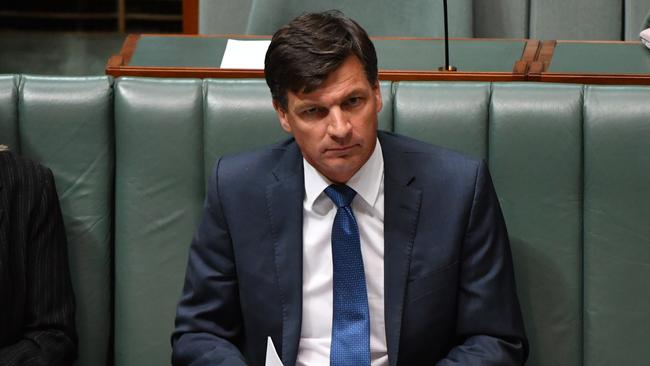Government brings back the big stick
The nation’s biggest electricity retailers face the return of the “big-stick” divestment laws.

The nation’s biggest electricity retailers face the return of the ‘‘big-stick’’ divestment laws after the Morrison government vowed to push ahead with controversial powers to tackle energy market manipulation, price gouging and anti-competitive conduct.
After a failed attempt to pass legislation in May, Energy Minister Angus Taylor indicated the laws would be bought back for a vote in September, setting the scene for tensions to be reignited with power companies which have labelled the move ‘‘draconian’’.
“The big-stick legislation is a priority for the government. We intend to bring the legislation back to the parliament in the spring sittings,” Mr Taylor told The Australian last night.
While the government softened aspects of the proposed legislation late last year — agreeing to judicial oversight of forced divestment orders for alleged market manipulation following threats of a constitutional challenge — the industry is concerned about the impact of beefed up government powers and the precedent it may set for the electricity industry and more broadly.
The Business Council of Australia said it recognised frustration over high power prices but warned interventionist measures may fail to lower bills due to the threat of forced company break-ups wilting investment.
“Australians are angry about high electricity bills and we represent large employers struggling under higher energy costs,” BCA chief executive Jennifer Westacott said.
“Getting prices down must be a priority but the solution should not undermine Australia’s ability to attract investment — the irony is investment in additional supply and new technologies is critical to lowering power prices.”
The government’s advisory body — the Energy Security Board — has previously warned the threatened powers could fail to bring tariffs down at a time when the transmission network needs fresh investment to handle a surge of new renewable energy supply amid rapid changes in the make-up of the grid.
However, Mr Taylor said the move would give the government another mechanism to ensure sufficient supply and more competitive tariffs.
“I’m pleased to say that we will be bringing forward later this year the big-stick legislation that those opposite have voted against 13 times in this parliament,” Mr Taylor said in question time yesterday.
“This legislation is vital to ensuring that we have another tool in the toolkit to maintain supply in the market and drive prices down, because we saw in 2016, as a result of the reckless targets of the Victorian Labor government, the exit of the Hazelwood power station, and the mere announcement of that exit saw a doubling of wholesale prices in Victoria.”
The legislation followed a report by the ACCC that found policy failings, overinvestment in network assets and deliberately confusing retail offers had all contributed to higher electricity bills. However, the far-reaching laws were not recommended by the regulator through its inquiry.
The big three integrated retailers and generators, EnergyAustralia, AGL and Origin, have argued the big-stick legislation discriminates against them, as well as other “gentailers” such as Alinta and the federal government’s Snowy Hydro, and discourages them from investing to bring in new generation capacity and replace ageing coal-fired stations.
After describing the legislation as ad hoc and extreme intervention last year, the BCA yesterday struck a more conciliatory tone, reflecting the Coalition’s election mandate.
“We don’t support intervention in markets, but we respect that the government took the policy to an election. We will engage constructively with them to ensure the legislation is workable for industry.”
Australia’s powerful business lobby did, however, sound a note of caution on a plan previously outlined by the Centre Alliance to extend big-stick powers to supermarket giants Coles and Woolworths.
“It is critical that this sort of legislation does not spread to other sectors in the economy,” Ms Westacott warned.
The proposed Treasury Laws Amendment (Prohibiting Energy Market Misconduct) Bill 2018, opposed by Labor and the Greens, would give the government unprecedented powers to seek divestment of generation assets as a last resort.
Nationals MPs threatened to revolt in March when the legislation was pulled and demanded it be brought back for a vote in the last sitting week before the federal poll on May 18.
Mr Taylor said in late May the government planned to revive the big stick now that it had a majority in the lower house and a potentially less hostile Senate. The Coalition will require only four crossbench senators to pass legislation opposed by Labor and the Greens. Centre Alliance had supported the “big-stick” laws in the lower house, suggesting the party’s two senators Rex Patrick and Stirling Griff would back the legislation.



To join the conversation, please log in. Don't have an account? Register
Join the conversation, you are commenting as Logout